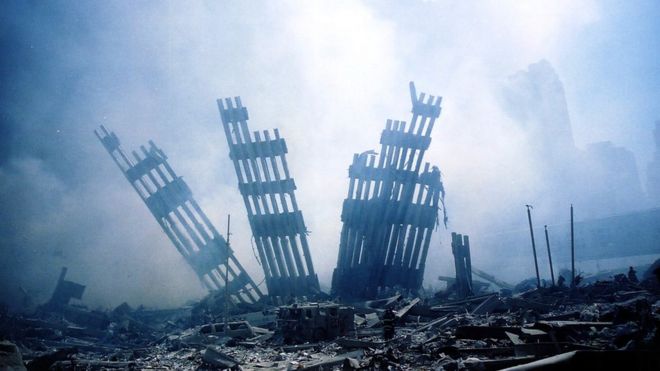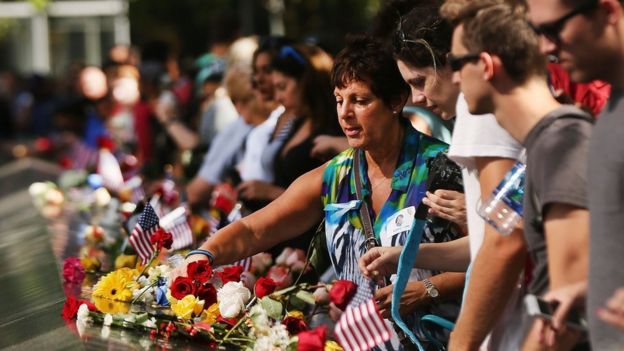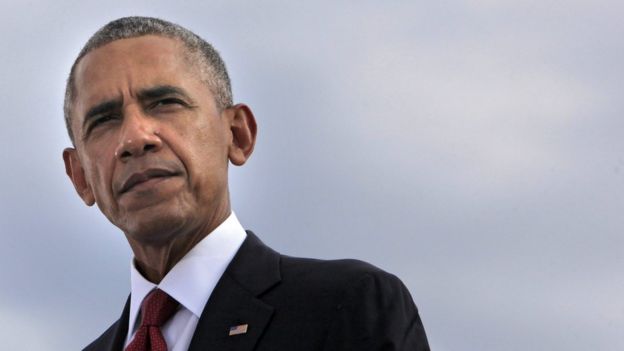- 29 September 2016
- US & Canada
-
(미국) 9/11법안이 무엇인데 그토록 논란이 많은가?국제문제/북미 2016. 11. 1. 12:17
출처: http://www.bbc.com/news/world-us-canada-37504158
** 밝은 하늘 **
오바마가 9/11법안에 거부권을 행사한 이유: 9/11에 관해 9/11희생자 가족이 명확한 증거도 없이 사우디를 제소할 경우 이것이 전례가 되어 미국이 과거에 다른 여러 나라에 가한 공격이나 전쟁이 부메랑이 되어 그 나라들이 미국을 제소할 가능이 있기 때문이다. 미국은 과거에 자기들이 남의 나라들에 못된 짓을 한 것이 워낙 많은 것을 알고 있어서 그것이 세상에 드러날까 두렵기 때문에, 오바마는 이 법안을 반대하는 것임.
What is the 9/11 bill and why is it so controversial? 구일일 법안이 무엇인데 그렇게 논란이 많은가?
 ALAMY
ALAMYThe families of 9/11 victims brought the bill to allow them to pursue Saudi Arabia's possible links to the attacks through the courts 법원을 통해 구일일 사태 희생자 가족들이 구일일과 연관됐을 걸로 보이는 사우디 아라비아를 제소할 수 있도록 허용하는 법안을 발의했다 A new bill passed through the US Congress is creating a storm - with President Barack Obama and the CIA warning of its dire consequences. 미의회를 통과한 새 법안이 바락 오바마와 CIA에 의해 끔찍한 결과를 불러올지 모른다는 경고가 나오면서 후폭풍이 일고 있다.
In passing the law that allows legal action against Saudi Arabia over the 9/11 attacks, Congress over-ruled a veto by Mr Obama for the first time in his presidency. 구일일 사태로 사우디 아라비아에 법적 행동을 할 수 있도록 허용하는 법안을 통과시킴으로써, 의회는 오바마가 임기 중 처음으로 행사한 거부권을 기각했다. (over-rule/기각하다)
So why is it so controversial, and what are its wider implications? 그렇다면, 이 법안이 어째서 그토록 논란이 많으며, 이 법안의 발효가 주는 영향이 뭐란 말인가?
What is the bill? 이 법안은 무엇인가?
The Justice Against Sponsors of Terrorism Act (JASTA) was brought by the families of 9/11 victims, to allow them to sue any member of the Saudi government suspected of playing a role in the attacks.
In practice, the bill permits civil claims against a foreign state or official for injuries, death, or damages from an act of international terrorism.
Why would the families want to sue? 왜 9/11 희생자 가족들은 제소를 원하는가?
Fifteen of the 19 terrorist who hijacked planes on 9/11 were Saudi nationals, and it has long been rumoured that senior Saudi officials were in some way linked to the attack.
Official inquiries since 2001 have found there is no evidence of either the Saudi government or senior Saudi individuals funding al-Qaeda.
However, a previously classified document earlier this year revealed "while in the United States, some of the 9/11 hijackers were in contact with, and received support or assistance from, individuals who may be connected to the Saudi government".
While the document did not provide any direct evidence of top-level Saudi involvement, it did raise new questions.
 GETTY IMAGES
GETTY IMAGESPeople marked 15 years since the 9/11 attacks earlier this month What is a veto? 거부권veto는 무엇인가?
A veto is one of the most significant tools an American president has at his disposal, and has been used more than 2,500 times in America's history to prevent the passage of legislation. According to the US' House of Representatives, even the threat of a veto can bring about changes.
Congress can overrule a veto however - but only if it has the support of two-thirds of the House and Senate. This has only happened on 110 occasions since 1792.
Despite this, it is unusual for a president in recent years to get through two terms without congress overruling a veto. George W Bush had four overturned, while Bill Clinton had two during his tenure. The last presidency to go unchallenged was that of Lyndon B Johnson.
Why didn't Obama want the bill?
President Barack Obama, who has only used a veto on 12 occasions and had, until now, never had one overruled, fears the amended law will leave America open to similar suits from other countries - especially as there is little consensus internationally on what constitutes an act of terrorism.
Stephen Vladeck, professor of law at the University of Texas, explained: "The real concern is that the more the US weakens the concept of foreign sovereign immunity, the more that the weakening will be used against it.
"President Obama is concerned that [something like] a drone strike against a suspected al-Qaeda target in Yemen or Pakistan or Somalia could very well be deemed by those countries as terrorism which could subject the US to significant liability in those courts." 오바마가 9/11법안에 거부권을 행사한 이유: 9/11에 관해 9/11희생자 가족이 명확한 증거도 없이 사우디를 제소할 경우 이것이 전례가 되어 미국이 과거에 다른 여러 나라에 가한 공격이나 전쟁이 부메랑이 되어 그 나라들이 미국을 제소할 가능이 있기 때문이다. 미국은 과거에 자기들이 남의 나라들에 못된 짓을 한 것이 워낙 많은 것을 알고 있어서 그것이 세상에 드러날까 두렵기 때문에, 오바마는 이 법안을 반대하는 것임.
But Terry Strada, national chair for 9/11 Families United For Justice Against Terrorism, has disagreed that the bill could backfire in the way the White House has warned.
"If we're not funding terrorist organisations and killing people, then we don't have anything to worry about," she said.
The bill may also have an impact on relations with Saudi Arabia, a key ally for the US in the Middle East.
Salman al-Ansari, president of the Saudi American Public Relation Affairs Committee, said Saudi Arabia could reduce valuable security and intelligence co-operation as a result.
 EPA
EPAPresident Obama fears the bill will open America up to lawsuits abroad What happens next?
The idea was to "clear away" obstacles and force an American court to answer whether and to what extent the Saudi government was involved in the 9/11 attacks.
But Professor Vladeck says in its creation the bill has created more blocks which will "probably" lead to "more litigation".
And even if the outcome is successful for the families, it will be little more than symbolic, he believes.
"The problem with JASTA is, it does not allow an American court to seize Saudi assets, or any foreign sovereign's assets, for this kind of claim," he says.
"So the best the plaintiffs can hope for is a piece of paper that says, yes the Saudi government was indirectly responsible because of funding, no you don't get any damages."
'국제문제 > 북미' 카테고리의 다른 글
(미국) 도날드 트럼프의 인생역정 (0) 2016.11.10 (미국) 2016년 미국대선에 관해 당신이 알아야 할 모든 것 (0) 2016.11.08 (미국) 작년도 미국 평균 가계소득 5.2%로 최고속 증가 (0) 2016.09.16 (미국) 미국의 CounterPunch는 어떤 단체인가? (영문) (0) 2016.08.25 (미국) 미국의 CounterPunch가 지적한 자국의 국제법 위반 사례들 (영문) (0) 2016.08.25